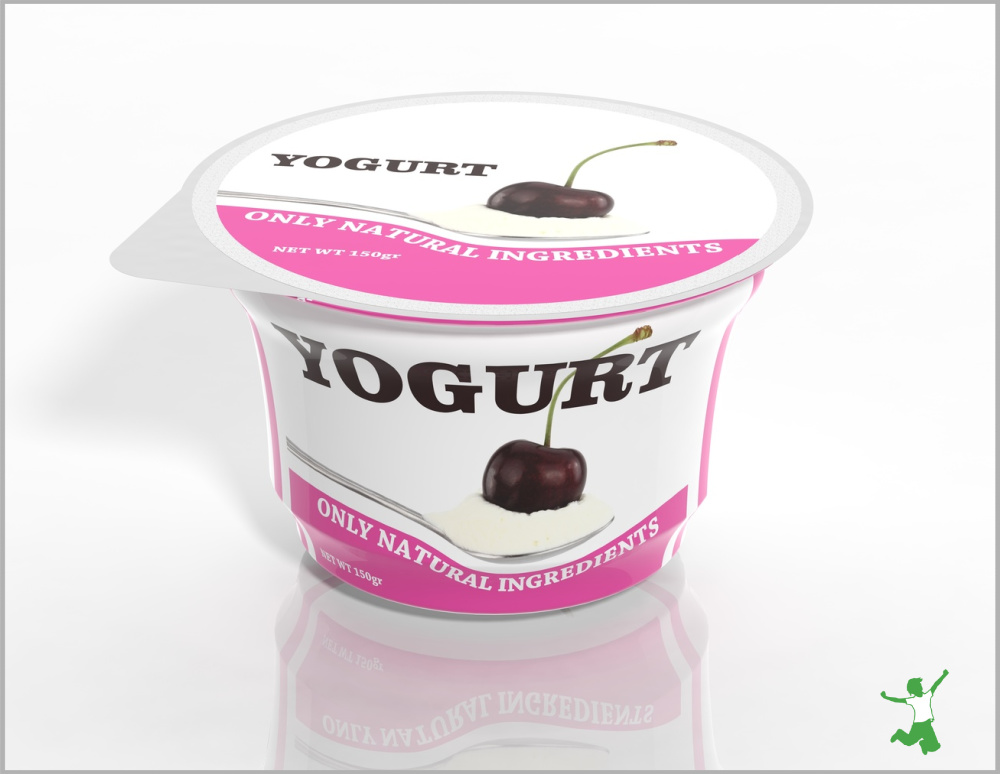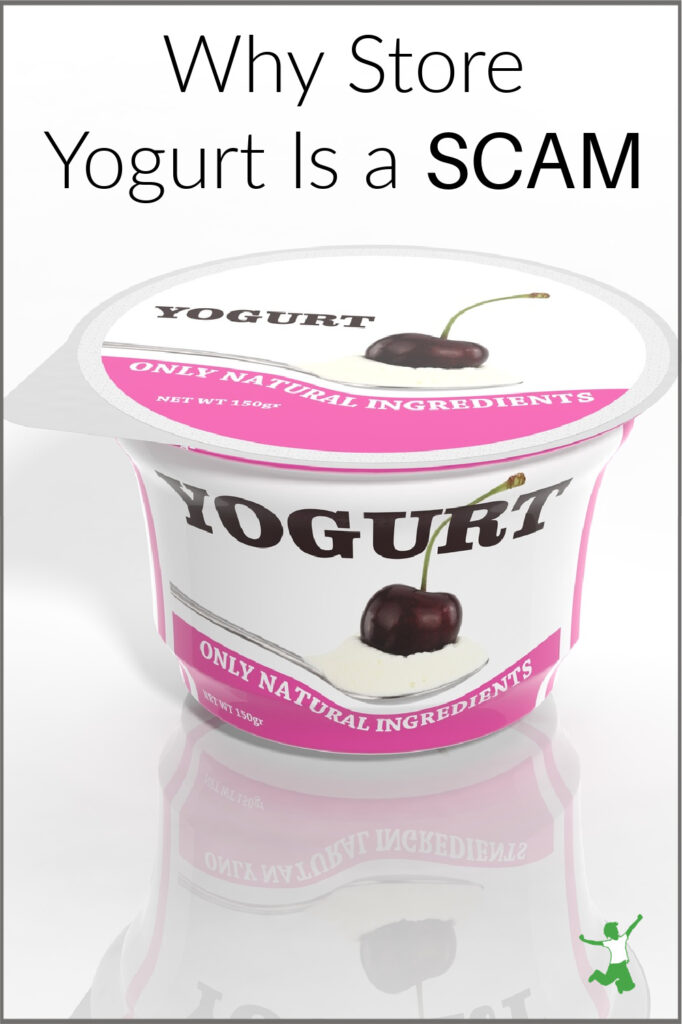The reasons why it is usually a waste of money to buy yogurt at the grocery store, the very few brands that are legit, and the best approach for enjoying yogurt that is truly probiotically active without breaking the bank.

As I was standing in line at the grocery store the other day, I noticed an older lady in front of me had an entire cart loaded with commercial yogurt.
I immediately felt very empathetic as she obviously was placing high importance on store yogurt in her diet. Perhaps she was attempting to help some sort of chronic digestive issue caused by the typical overmedicating of people her age.
What is really sad is that it is virtually certain that she was experiencing little to no benefit from her efforts and money spent.
This is because standard store yogurt, including those squeezable yogurt tubes for kids, is not the probiotically beneficial food that TV commercials and other compelling advertisements would lead you to believe.
The truth is that commercial yogurt is fermented for very short periods of time.
This includes highly popular Greek yogurt alternatives.
Improper Fermentation
The length of fermentation for commercial yogurt brands is so short (one person in the dairy industry told me that it is an hour or even less) that thickening agents are commonly added to give it the look and feel of real yogurt.
This is why Dr. Natasha Campbell-McBride MD, author of Gut and Psychology Syndrome, recommends avoiding commercial yogurt.
Instead, she recommends making yogurt at home and fermenting it for a full 24 hours to achieve maximum gut healing benefits.
The Specific Carbohydrate (SCD) Diet also recommends yogurt that is cultured for a full 24 hours.
Milk Sugars (Lactose) Still Present
Another problem that occurs by cutting corners at the factory is that commercial yogurt still contains plenty of lactose, as there was insufficient time for it to be completely consumed by the beneficial microbes.
Lactose is a disaccharide sugar, which is very difficult to digest for anyone with a digestive disorder.
Raw milk and raw yogurt contain lactase, the enzyme for digesting lactose, but pasteurized and homogenized store brands do not even if they are organically certified (heat destroys the enzyme lactase).
Thus, consuming commercial yogurt can often trigger autoimmune symptoms until steps are taken to heal and seal the gut wall so that it is no longer permeable.
In short, not only will store yogurt NOT help heal the gut, it can potentially make the situation WORSE.
GMO Sweeteners
Another problem with commercial yogurt is that sweetened versions often are of GMO origin.
Even health-savvy shoppers often don’t realize that if the label on commercial yogurt says “sugar”, it is virtually certain that sugar is also from a GMO source (beet sugar).
Only if the label says “cane sugar” or “organic sugar” does this guarantee that the sugar is GMO-free.
Other Considerations
Of course, making yogurt at home permits the selection of high-quality milk and avoidance of all the additives and sugar added to most commercial versions.
Yogurt fermented for 24 hours will most definitely assist your gut with the help of beneficial (though transitory) cultures that good quality yogurt is loaded with.
It is also helpful to note that yogurt made with raw milk will be naturally more drinkable-style like kefir than yogurt made with heated or pasteurized milk.
Cannot Make Yogurt Yourself?
The best policy when it comes to yogurt is to always make it yourself or buy it from a small farm that uses quality grass-fed milk (preferably raw) and ferments it properly.
You don’t need a yogurt maker! I make raw yogurt using a slow cooker. You can even make yogurt using your microwave (turned off, of course!) or oven as a low-temperature incubator.
If you must buy commercial yogurt when traveling, be sure to seek out one of the only two brands of 24-hour yogurt I’ve found that are commercially available (White Mountain and St. Benoit).
If you’ve come across any others, please add them in the comment section!
My online shopping hack will help you find these brands very quickly even if you are unfamiliar with the area you are visiting.









How do you go about making yogurt? We have 2 gallons of raw milk (there was a mix up when my husband and I went on vacation, so we got extra) and I need to do something with it before it goes bad. 🙂
I assume that coconut milk based yogurt made with the 24 hour fermentation is healthier than store bought equivalent, too? Due to our current dietary restrictions, we can’t do dairy & my son is missing yogurt.
We also have dairy allergies here. I too am interested in more info on non-dairy yogurts. Help! I have never made yogurt but I want to begin and I don’t know where to start.
culturesforhealth.com is one source of info. but I’m still searching on line for recipes to figure out which one might be best to start with. Expensive to experiment.
Perfect timing for this article as I just recommitted myself to making my own yogourt!
Perfect timing for this article as I just recommitted myself to making my own yogourt!
Store Yogurt Won’t Do Squat for Your Health – The Healthy Home Economist http://t.co/cMUL55Pk
We eat yoghurt more often over summer. I’ve had a couple of attempts at making my own, with varying degrees of success depending on expectations. I would like to let my yoghurt sit longer, but our climate is really warm. In summer, I would be lucky to find anywhere in the house that is less than 25C during the day, and more likely up around 30C. Night temperatures are similar. Any advice on how I should approach my yoghurt making? I have access to unpasteurised goat and cow milk, as well as good-quality pasteurised (non-homogenised) cow milk. I would be keen to try kefir, but also not sure how it goes with the heat. Oh, and summer is long – November to March.
Andrea
I”ve made yogurt using raw goats milk for years. Usually just try to time starting it to milking time, it’s a good temp that way without any additional heating. I use a good quality yogurt like plain Fage, or Fage, Cabot plain whole milk Greek as starter if I need. I have an old fashioned gas stove with a pilot light and leave in for 12-16 plus hours. It’s initially thinner but after refrigerating thickens up. The freshly made makes great base for salad dressings with blue cheese or herbs added. We usually just add a little local honey or fruit to the yogurt. People who are use to sickly sweet commercial yogurt find it tangy but we love it.
GoatMom,
Can you elaborate on your process a little for me? I bought two dairy goats a few months ago and I would love to start making my own yogurt. Your post really intrigued me. Thanks!
I make my own, but used commercial yogurt as a starter. Is that okay?
I think that should be ok as long as you ferment it for awhile – 24 hours is great.
Would you post your yogurt recipe? I’d love to see how you make it. What if you can’t afford to use raw milk for making yogurt?
Hi Margie, I buy my yogurt from a small farm. I do make my own kefir which I have a video for on this blog if you want to watch that to learn how to make.
I have always wondered about storebought yogurt. I knew the sugar content in them were not good but I didn’t realize there was hardly an probiotics in them.
I have also been wondering, how much cultured dairy and fermented foods should we be comsuming daily for optimum health? I know it could vary from person to person but how much do you consume?